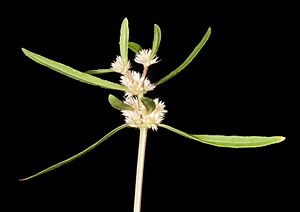Alternanthera denticulata facts for kids
Quick facts for kids Alternanthera denticulata |
|
|---|---|
 |
|
| Scientific classification | |
| Synonyms | |
|
Alternanthera denticulata var. micrantha Benth. |
The lesser joyweed (scientific name: Alternanthera denticulata) is a small plant with white flowers. It is a type of herb that often grows flat on the ground. This plant belongs to the Amaranthaceae family, which includes many well-known plants like spinach and amaranth.
You can find the lesser joyweed growing naturally across all parts of Australia, New Guinea, and the North Island of New Zealand. It's also an important food source for the caterpillars of a butterfly called the varied eggfly (Hypolimnas bolina nerina). A famous botanist named Robert Brown first described this plant in 1810.
What Does the Lesser Joyweed Look Like?
The lesser joyweed is a plant that can either spread flat along the ground (prostrate) or grow upright (erect). It's a perennial herb, meaning it lives for more than two years. Its stems can even grow roots from their joints, helping the plant spread.
The stems are usually green, sometimes with a pink tint. They can be slightly hairy or smooth. The joints of the stems are often covered with dense, tangled hairs, which is called "tomentose."
Its leaves are typically 3 to 8 centimeters long and 0.6 to 1.2 centimeters wide. They are light green, yellowish-green, or sometimes have a pinkish color. Both the main vein (midrib) and the side veins of the leaves can appear pink. The edges of the leaves can be finely toothed or completely smooth.
Where Does the Lesser Joyweed Grow and When Does It Flower?
This plant likes damp places. In Western Australia, it grows in both sandy and clay soils. You can often find it along the banks of creeks, rivers, and swamps. Here, it usually flowers between April and August.
In the North Island of New Zealand, the lesser joyweed prefers coastal areas and other wet places. It also grows along the edges of lakes and in other moist ground. In New Zealand, you can see its flowers almost all year round, from January to December.
How Is the Lesser Joyweed Protected?
In New Zealand, experts have looked at the conservation status of the lesser joyweed. They have classified it as "Data Poor," which means there isn't enough information to fully understand its situation there. However, they also say it is "Secure Overseas," meaning it is not considered endangered in other parts of the world where it grows.

